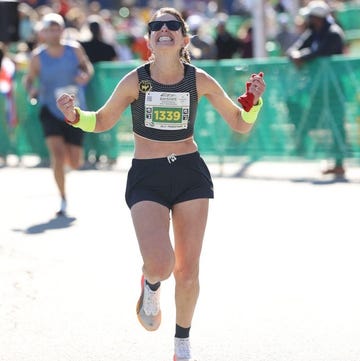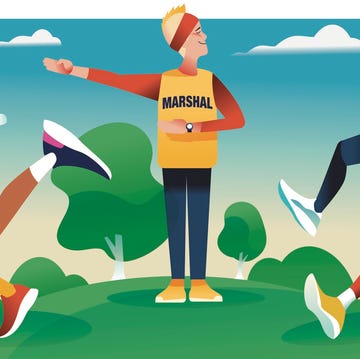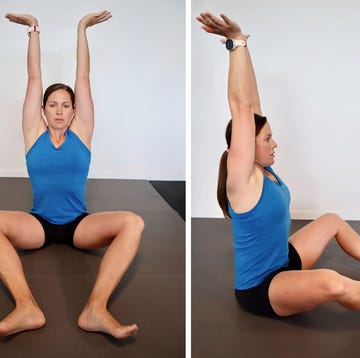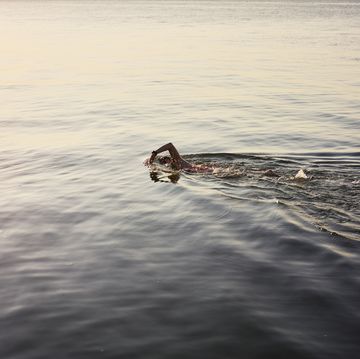GETTY IMAGES |
Q. What single aspect of training would help me run a faster marathon? Intervals, tempo sessions or more miles? Johnny Blaze
A. Unfortunately, it's just not that simple. Making improvements is all about the overall mixture - how you put long runs, speedwork, tempo sessions, rest and warm-up races together. The single most important session though is the long, slow steady run.
Q. I was hoping for a sub-4:00 marathon but have been setback by injury. My best run so far has been 13 miles in just under two hours. With just over five weeks to go, what would you recommend for getting used to the distance? How to get started on the running track
A. Focus on building up your long runs every week - for example 15 miles, 17 miles and so on. Also, try to do some faster mid-week runs so things will feel easier when you reach halfway.
Q. I'm running a 20-mile race this weekend to gauge my pace. I don't want to run too hard as I may not recover in time and it might affect the remainder of my training. Should I aim to run the first half slower, and the second half at marathon pace? Experimental Penguin
A. I agree - running a flat-out 20-miler at this stage would be a risk. But by pacing the race as you suggest, you can turn it into an excellent training session without exhausting yourself. Make sure you hold yourself back in the first half and don't go mad when you hit the acceleration phase. Count how many runners you can overtake in your fast period to make it more interesting!
Q. I've a couple of 20-milers and long races under my belt so far, but I'm concerned about breaking down before race day. How many more long runs should I do? Ian Burdin
A. One more 20-miler should suffice. Try to run a shorter longer run at marathon pace too - if you keep your other runs shorter still, you should be fighting fit for the marathon.
Q. I did a local 20-mile road race, but although it advertised plenty of drinks stations these were only stocked with water. I hadn't taken any energy products with me, and at around Mile 14 I ran out of gas and plodded home 10 minutes behind schedule. What advice can you give on fuelling - how often and when during a marathon? Anthony Scott 3
A. Personally, I like to consume a carbo-gel at the start, another between 10K and 10 miles, a third carbo-gel between Miles 13 and 15 (I find this one the most useful) and a final one at about Mile 20. I keep myself topped up with energy drink too. Of course, no fuel strategy can make up for poor pacing or insufficient training.
Q. I'm thinking about entering a 10-mile race the weekend before the marathon. If I run it at marathon pace (or just a bit faster) will it do me more harm than good? I also do a club marathon-pace session on Wednesdays - should I do this session so close to a marathon? Stat
A. Running 10 miles flat out the week before is too much. 10 miles at marathon pace should be OK, as long as you refuel immediately afterwards and have a relaxed easy week.The fast mid-week club run has probably done you well up to now but it might be best to run with slower runners the week before your marathon so you don't overdo it!
Q. Is it better to start at the pace you want to maintain (in my case, 9min/mile) or start a little slower, see how its going and try and catch up in the second half? Neil Sharma 2
A. Space permitting, set off as close to the pace you need to run as you can. Take care not to go too fast - just try and get into a nine-minute-mile rhythm. Practice it in training so you can settle into it automatically.
Q. How much fluid should I drink on the morning of the marathon? Last year I drank too much and had to use the loos on the way round! inlastplace
have to be careful not to overdo the drinking and stick pretty much to what you are used to in training pre race. remember there are drinks every mile and unless it is very hot you don't need to drink at every drinks station. Drinking too much is more dangerous than drinking too little
Q. This will be my seventh marathon - my PB is 3:05 (last year). I've managed to hit all my training targets (for a sub-3:00 marathon) but my mileage is relatively low as I'm extremely injury-prone. Should I still be aiming to run sub-3:00? JFDI
A. If you have stuck to the times and training then you should be fine. Not everyone can handle high mileage. The sessions are more important than the numbers - as long as you do the long runs, then the rest of the week is not too important.
Q. Do you have any tips for a brand new runner who has a year to train for a marathon? I've found a 16-week schedule and want to make the most of the year to really prepare myself, but I don't want to do too much too soon. NorwichRunner
A. In theory, the fitter you can get prior to starting the schedule, the faster you will be when you start your marathon training. Get into a regular routine of a weekend long run (building up gradually), some faster mid-week runs and a few faster efforts in the middle of some of your sessions. It's probably best not to do too much speedwork initially - build up your stamina, and do everything gradually to let your body accustom itself to the higher workloads.
Neil Sharma 2? Ang12
A. The marathon will leave you with plenty of fitness to keep your endurance levels high during the summer. Firstly, make sure you recover properly after the race and don't do too much for a few weeks afterwards. Then, gradually try and get back into a routine - a month after the marathon you should start upping the pace of your runs and target some shorter races. If you've been doing 50 miles a week during your marathon build up, 35 - 40 miles a week should be sufficient to maintain your endurance and still allow you to train faster to increase your speed and speed endurance.
Don't miss our next live forum debate - part of a series in our 2009 Flora London Marathon build-up. On Friday April 3, we'll be welcoming back Nick Morgan, Lead Sports Scientist at Lucozade Sport between 1pm and 2pm to answer your last-minute fuel and hydration questions. Pop the date in your diary now!












